Top 5 Must-See Attractions at Jing Jai Market: Travel Guide
Jing Jai Market (also known as JJ Market in Chiang Mai), a bustling open-air market located in Chiang Mai, offers an authentic and environmentally conscious shopping experience. Renowned for its organic, locally sourced produce and eco-friendly products, JJ Market provides a delightful haven for health-conscious shoppers and sustainable living enthusiasts. This vibrant market is also home to a variety of food stalls, artisan crafts, handmade clothing, and unique souvenirs, making it an ideal destination for visitors looking to immerse themselves in Chiang Mai’s rich culture and support local businesses. Open every weekend from early morning to late afternoon, Jing Jai Market is a must-visit attraction for tourists and residents alike.
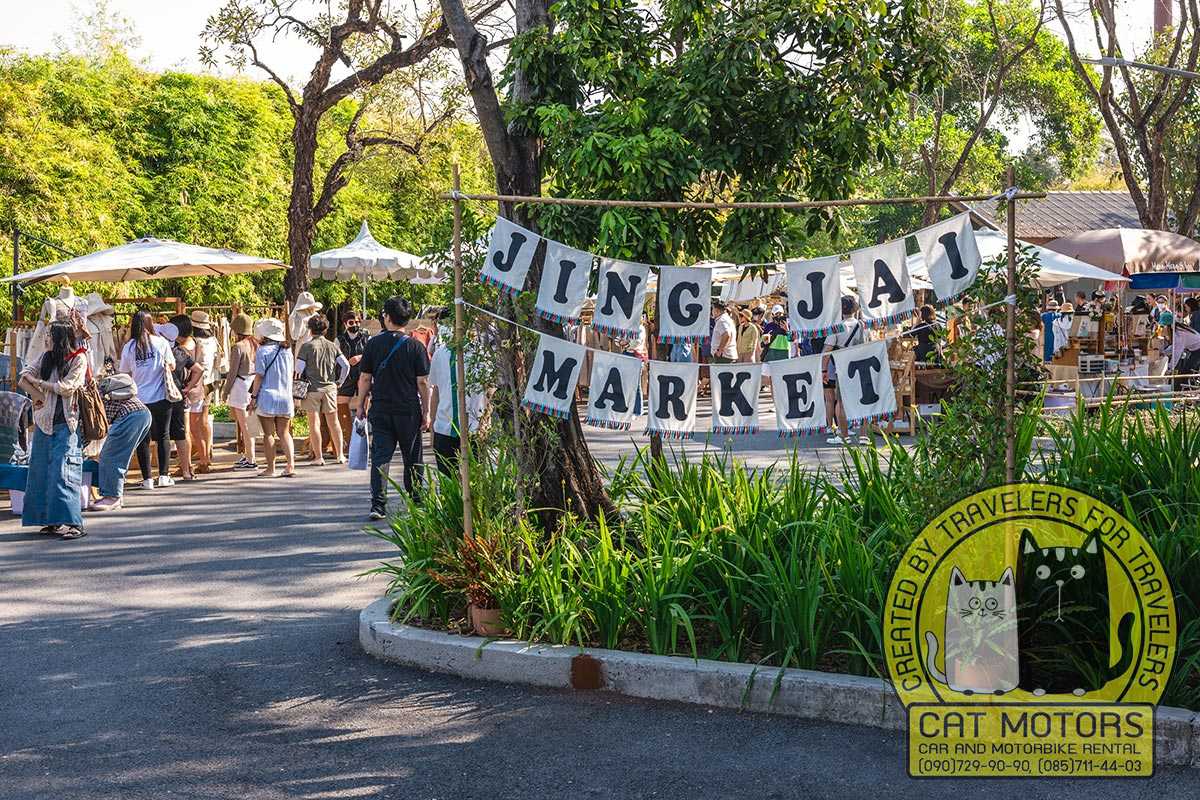
Chiang Mai, a charming city in northern Thailand, is well-known for its majestic temples, lush vegetation, and delicious cuisine. But for bargain hunters and shopaholics eager to experience the local culture, Jing Jai Market is an activity not to be missed. It offers an authentic shopping experience boasting unique handicrafts, mouth-watering food, and local products.
You will find the vibrant Jing Jai Market (Google Maps) on Atsadathon Road in the Pa Tan subdistrict, Muang district, Chaing Mai. This idyllic outdoor market is set under a glade of tall trees, providing a peaceful and cooler shopping experience. The Jing Jai Market is home to hundreds of stalls and even a small temple.
As you enter the market, the craft and clothing stalls are your first temptations, and by the time you reach the far end, your appetite will force you to succumb to the alluring sight and smells of street food and organic produce.
Although there is much chatter, laughing, and music, the atmosphere remains relaxed without noisy motorbikes and scooters, which are not permitted. The music usually comes from the food court, where you can enjoy performances by live bands and other artists while you enjoy a hearty meal or a mid-shopping snack break to refuel before continuing your adventure through the local market.
The History And Significance
The Central Group established this favorite open-air market in 2012 as one of their CSV (Creating Shared Value) projects, with the support of the Chiang Mai Food Safety program. The market encourages healthy food awareness and supports pesticide-free and organic farming, as the Central Group is passionate about the environment and the development of the local community.

The JJ Market falls within the creative space known as Jing Jai Central, which also includes two other zones: Jing Jai Village and Jing Jai Gallery. The market has many restaurants and cafes offering local cuisine and organic produce. In addition, it also provides space for creatives to sell their handicrafts and share their knowledge about their hobbies and crafts.
On the weekends, the Farmers’ Market And Rustic Market are excellent opportunities for the local farmers to boost their incomes with the heavy foot traffic that passes their stalls. This weekend market is one of the most popular Chiang Mai shopping areas for locals and tourists alike.
The Phenomenal Growth Of The Market And Its Impact
The Jing Jai Weekend Market (Farmers’ Market) began with just ten stalls. It has now morphed into a massive event with more than 70 families from 15 communities earning an income with their produce and 250+ local artisans selling their products and food.

The market is an incredible source of sustainable income for these families, simultaneously promoting local Chiang Mai products. It attracts scores of international and local visitors, bringing in 40 million baht (approximately $1.7 million) annually to the Thai economy.
What To Expect At The Lively Jing Jai Market
The Jing Jai Market is upbeat and vibey, with friendly vendors, excellent street food, and a wide array of crafts and produce. It’s not your typical flea market aimed at international visitors looking for tourist trinkets, although you will find plenty of items that will make stunning souvenirs.
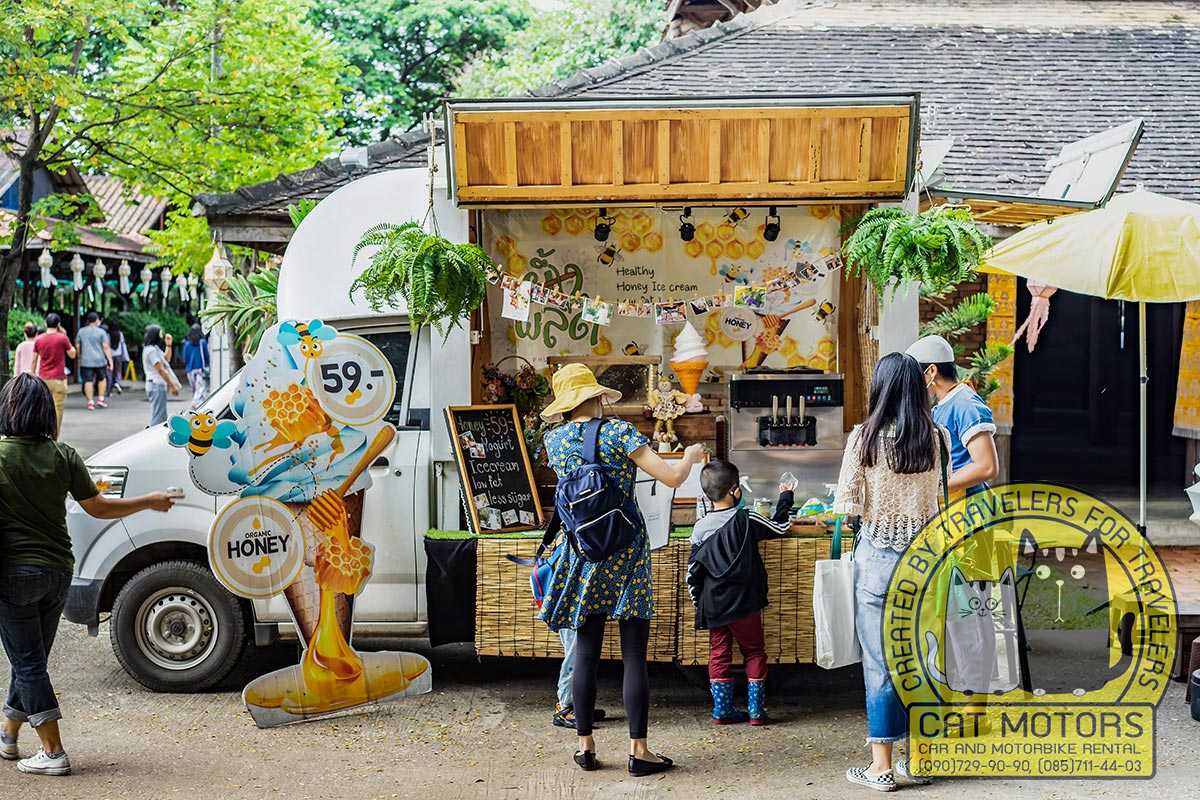
There is something for everyone at market, a place for creatives, farmers, and foodies to display their goods. Nearly all items are handmade, and food is homecooked or prepared on-site. Much significance is given to food quality and safety, emphasizing environmentally-friendly practices.
Trading Hours And Best Times To Visit
The JJ Market Project is open daily from 9:00AM – 8:00PM, although shops might have their individual trading hours.
Visiting these stores during the week is a suitable outing for the whole family. There are eateries, an organic grocery store, Tops Green, coffee shops, handicraft stores, clothing shops, and lifestyle stores open in the project during the week. And if your little ones get edgy, there’s a playground where they can work off some of that pent-up energy.

The Farmers’ and Rustic Weekend Market is open from 6.30AM to 2:00PM on Saturdays and Sundays. The best time to go is early on Saturday or Sunday mornings. Despite the shady trees, it can get very warm while you meander around the many stalls. And to do this market justice, you will need about three hours to see everything and enjoy some of the tasty food on offer.
Another positive feature of JJ Market is its fully wheelchair-accessible parking, entrance, restrooms, and seating. Many wheelchair users travel across the world, but not all destinations are wheelchair friendly, which should be mandatory. It’s a credit to this market that they have embraced wheelchair-friendly principles.
5 Highlights Of A Visit To Jing Jai Market
Jing Jai Market is a place of many experiences. While the weekend market is a stunning morning outing, it’s not the only entertainment that takes place there.
Exciting Events
The venue hosts festivals, parades, music performances, and more. Recently, contestants in the Miss Grand Thailand 2023 visited the market, and the venue also hosted a Lanna cultural show. Even when there are no special events, you can expect musical entertainment at the Farmers’ Market on the weekends.
You can also visit the Jing Jai art gallery, which hosts exhibitions displaying the work of local artists. The collections often have themes relating to the environment or the beauty of nature. The Central Group and local artists believe in opening up their art to everyone, so admission to the gallery is free.
A Variety Of Handicrafts And Souvenirs
As you enter JJ Market, you step right into the craft section. There’s a massive variety of what you can buy in this section. You will find clothing stalls, some with modern clothing, while others offer traditional clothing and accessories. One store even sells safari suits embroidered by hand.
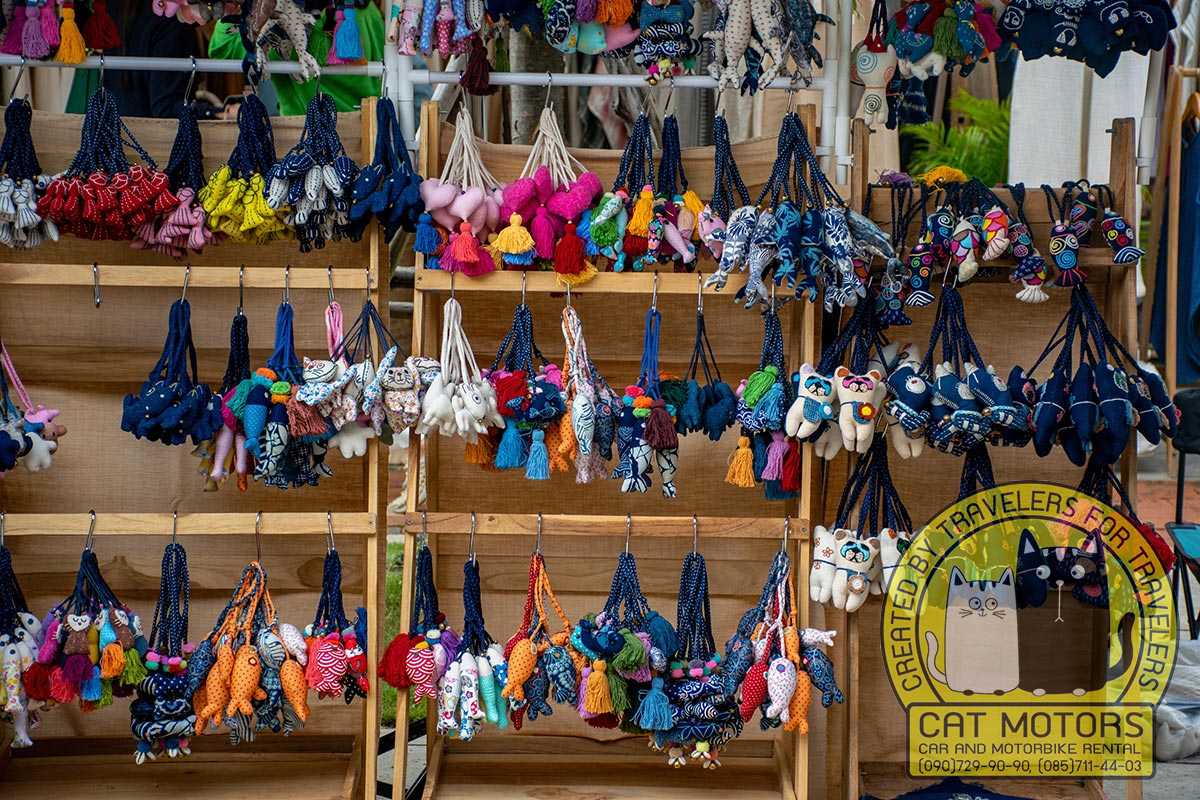
Handmade and factory-made handbags are popular purchases, and you can find pottery, jewelry, wooden carvings, and all kinds of interior décor. The talented Thai artisans are also skilled at making almost any household items from bamboo and rattan, including furniture, baskets, and more. These are also on offer at the market.
While you will find a lot of traditional handicrafts and souvenirs in JJ Market’s craft section, other quirky stalls sell items like funny badges and odd mixes of second-hand goods.
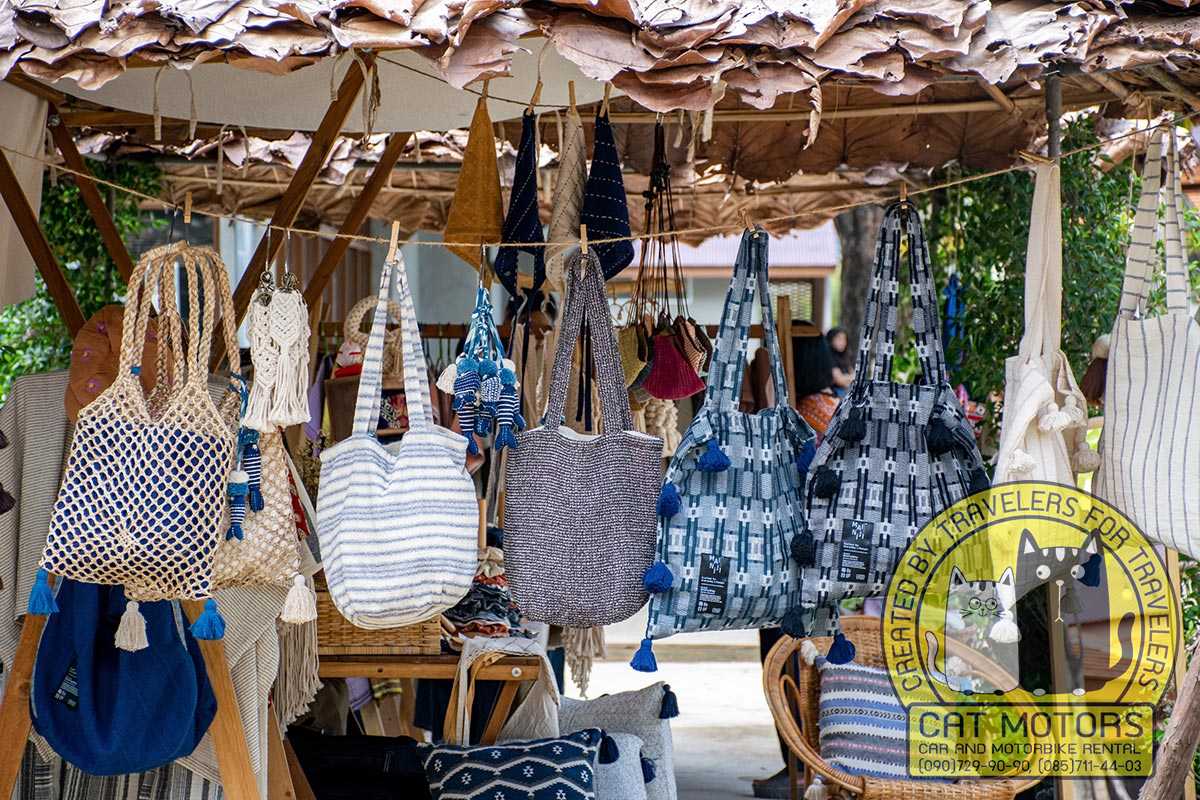
If you’re taking souvenirs home to remember your trip to Northern Thailand, JJ Market offers you unending possibilities. You will also find many gifts for loved ones, but souvenirs can never convey the magic of Thailand to someone who hasn’t experienced it. Nevertheless, if you’re looking for interesting gifts or souvenirs, consider the following:
- Thai silk
- Soap Carvings
- Handmade bags
- Thai silver
- Copper and brass jewelry and trinkets
- Ceramics and pottery
The Fascinating Brass Jewelry And Ornament Store
Saprang, a surprisingly easy-to-pronounce word meaning “blooming” or “beautiful,” is the apt name of a store selling brass jewelry and ornaments. A designer couple, who both graduated in jewelry-making, own this store. They generally create pieces that reflect the beauty of nature and have also branched out into clothing to accentuate the jewelry, as well as décor and household goods.
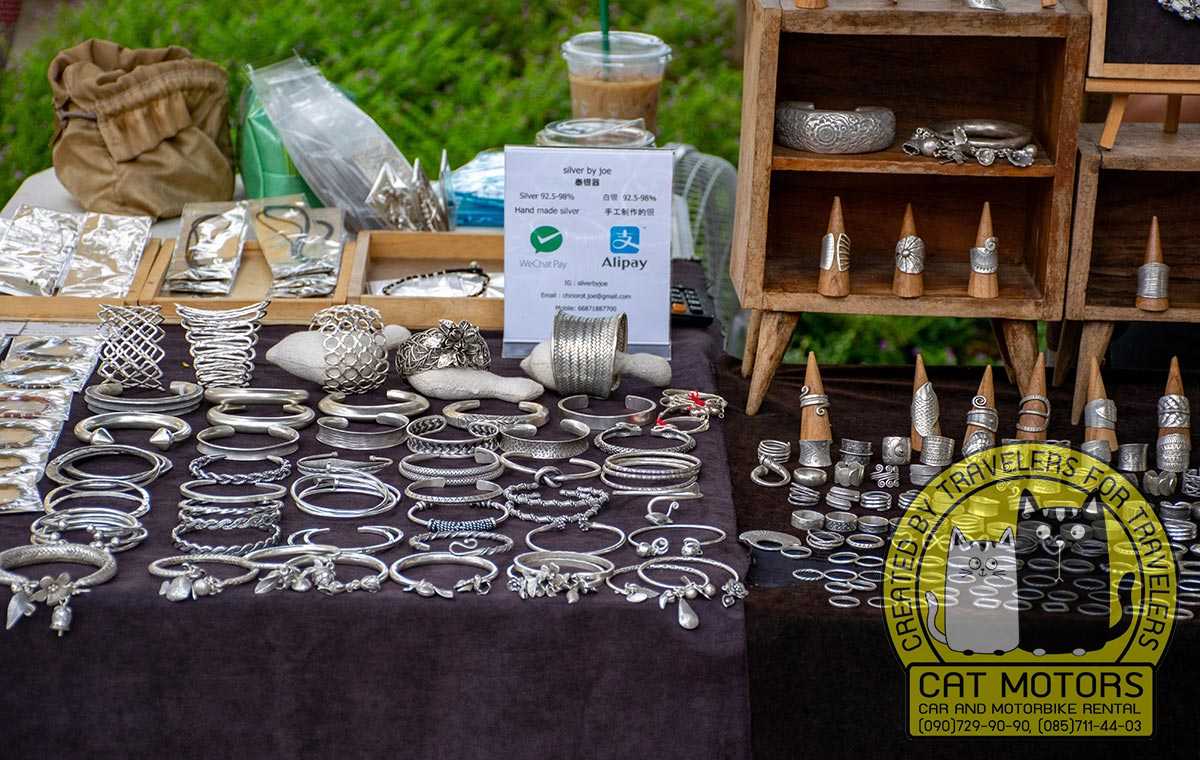
Each piece is unique and made from scratch by the designers, and they love to chat with their customers about the stories behind each piece. This store is well worth a visit for its unique products.
Mouth-Watering Food
Just because Thai people tend to be slender, don’t for a moment think that you might lose weight while on vacation because there is lots of food to choose from, and the temptation is real at Jing Jai Market in Chiang Mai!

It is true that there’s an entire section devoted to organic produce, which is great for health nuts. Still, there are so many aromas and sights of authentic Thai food that bombard your senses, forcing you to try as many dishes as your pocket and appetite will allow.
You can also buy traditional teas and coffees at stalls and restaurants, as well as herbal waters to cool you down after a morning of heavy shopping.
Traditional Dishes To Try
If you’re a stranger to Thai food, your tastebuds will be introduced to a kaleidoscope of new tastes, from spicy curries to sweet baked goods and desserts. These are some must-try Thai dishes at Jing Jai farmers market:
- Pad Thai is an iconic Thai dish, a happy marriage of sweet and savory flavors. It’s a stir-fried combination of tamarind, bean sprouts, fried egg, peanuts, and lime, tossed in a wok with noodles.
- Som Tam is a delicious option when you’re in the mood for a salad. It’s made with carrots, tomatoes, and shredded green papaya, tossed with some garlic, sugar, peanuts, lime juice, and several chilies for a tasty bite! Thai salad can definitely not be labeled boring!
- Massaman curry is a famous dish made with potatoes, a protein like beef, chicken, or tofu cooked in coconut, and a combination of fragrant spices.
- Mango sticky rice is a favorite Thai dessert, a simple dish consisting of sliced mango and sweet sticky rice infused with coconut milk.
- I Tim Kati or Thai Coconut Ice Cream is a favorite with children and adults. It’s made from coconut milk and served in a coconut shell. I Tim Kati is available in all public spaces where street food is sold.
Aside from the fruit and vegetable stores, there are several vegan and vegetarian options, including a vegan bakery. Prices vary, but they are not exorbitant.
There’s an unending list of snacks, too long to mention, but we have to single out edible insects. Unbelievably to Westerners, it’s a real thing. You can buy them fresh or packaged like chips. Foreigners may consider it a prank gift for their loved ones back home, but it’s not a strange snack in Thailand.
Organic And Eco-Friendly Products
Jing Jai Farmers Market supplies high-quality organic produce, baked goods, and ready-made food. They are sold by farmers who avoid using chemicals in animal husbandry and crop farming. The word Jing Jai translates to sincere in English, which applies to their honest and trustworthy standards, which include:
- All farmers hold certificates or documents declaring their produce is organic and pesticide-free. Market officials inspect the produce before farmers are permitted to become vendors.
- Officials also do random checks on chemical residues in products. They perform these tests in a laboratory once a week.
- Regulations prevent the reuse of frying oil, and market officials also monitor this regularly.
- Food ingredients must meet the Food Sanitation Program’s standards, and MSG is prohibited.
- Market management also checks vendors’ scales for accuracy, and customers can also check weights on public scales.
- JJ Market and the Central Group are passionate about creating an eco-friendly environment. Plastic bags, staples, and Styrofoam are prohibited.
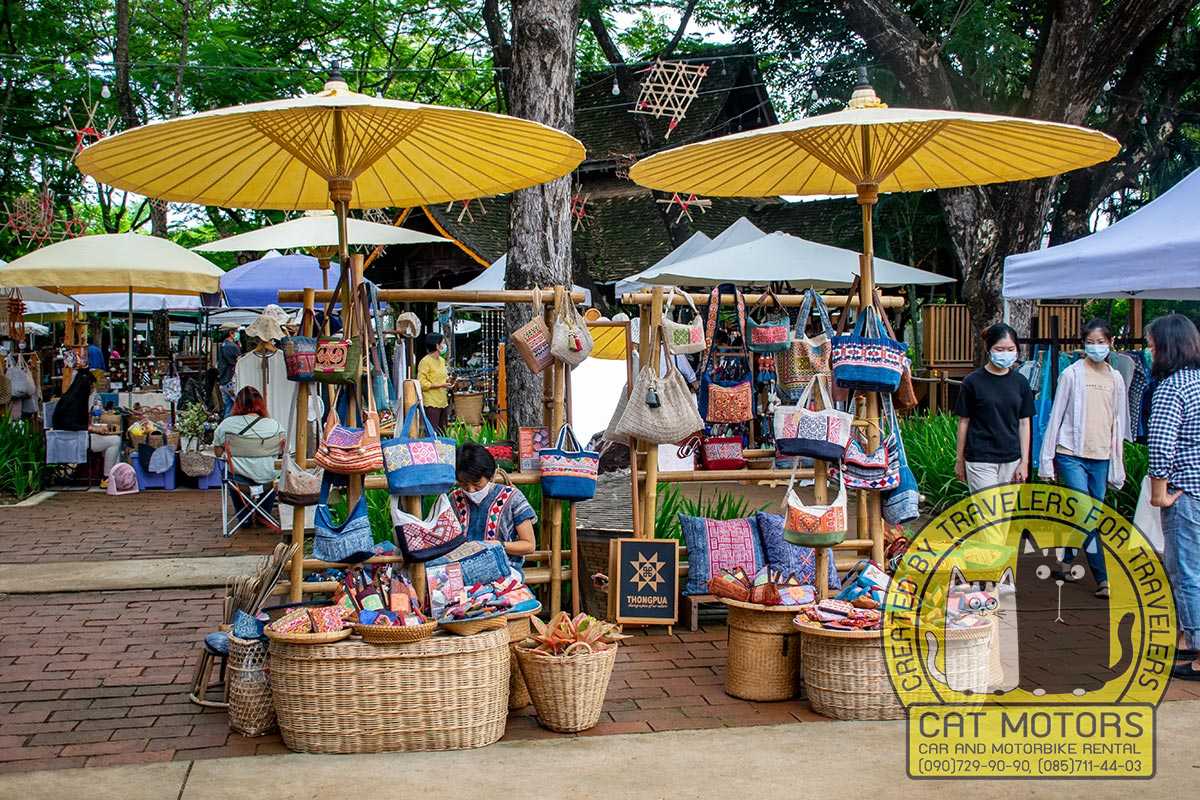
Jing Jai Market is all about creating a thriving community with shared economic benefits. It focuses on selling high-quality, eco-friendly goods and allowing the local population to build sustainable incomes from their creative skills.
On The Move To JJ Market
JJ Market is a little north of old Chaing Mai. If you’re staying near the North Chang Phuak Gate and feeling energetic, you could take a 20-25 minute walk to the market. It’s also an easy option to take a GrabTaxi or GrabCar using the e-hailing Grab app.
Now that you know about this fabulous market, you may decide to squeeze in a visit before you leave Chiangmai. And it’s totally doable because the market is only 10 minutes from the Chiang Mai International Airport and 7 minutes from Central Chiang Mai.
Places To Visit Nearby
There are innumerable attractions to visit near Chiang Mai and Jing Jai Market, but since one can’t do everything, choose from some of the top attractions nearby.
- Visit the Chang Mai Elephant Sanctuary
- Doi Inthanon – Thailand’s highest point
- Cooking courses at a local organic farm
- Chiang Mai Thapae Muay Thai Boxing Stadium
- Tha Phae Gate
- Sunday Night Market
Tips To Remember
When arriving at JJ Market, you can park on Atsadathon Road and at the Grand Napat a little further down. If you have specific stalls you want to see, consult the directory board at the entrance to the market.
Bargaining For Better Deals
Prices on items are mostly guidelines. It is customary to negotiate with the vendors for a better deal. Here are some pointers when bargaining for better prices.
- Start by negotiating 30%-40% below the initial price.
- Shop around and negotiate at all stalls.
- Act only marginally interested in the products.
- Start walking away to see if the vendor wants to re-negotiate
- Buy more to get an increased discount.
Cultural Etiquette And Thai Manners
Here are some principles to remember when interacting with Thai people:
- Always smile at people and return their wai, the greeting with a slight bow and prayer-folded hands.
- Always use your right hand to pass goods or money.
- Show extra respect to monks.
- It’s considered rude to touch anyone’s hair or head.
- Don’t point at people.
- Be patient, and don’t lose your temper.
- Don’t ever disrespect the king or his image on money or elsewhere – it can land you in prison!
- Throwing things in someone’s direction is rude.
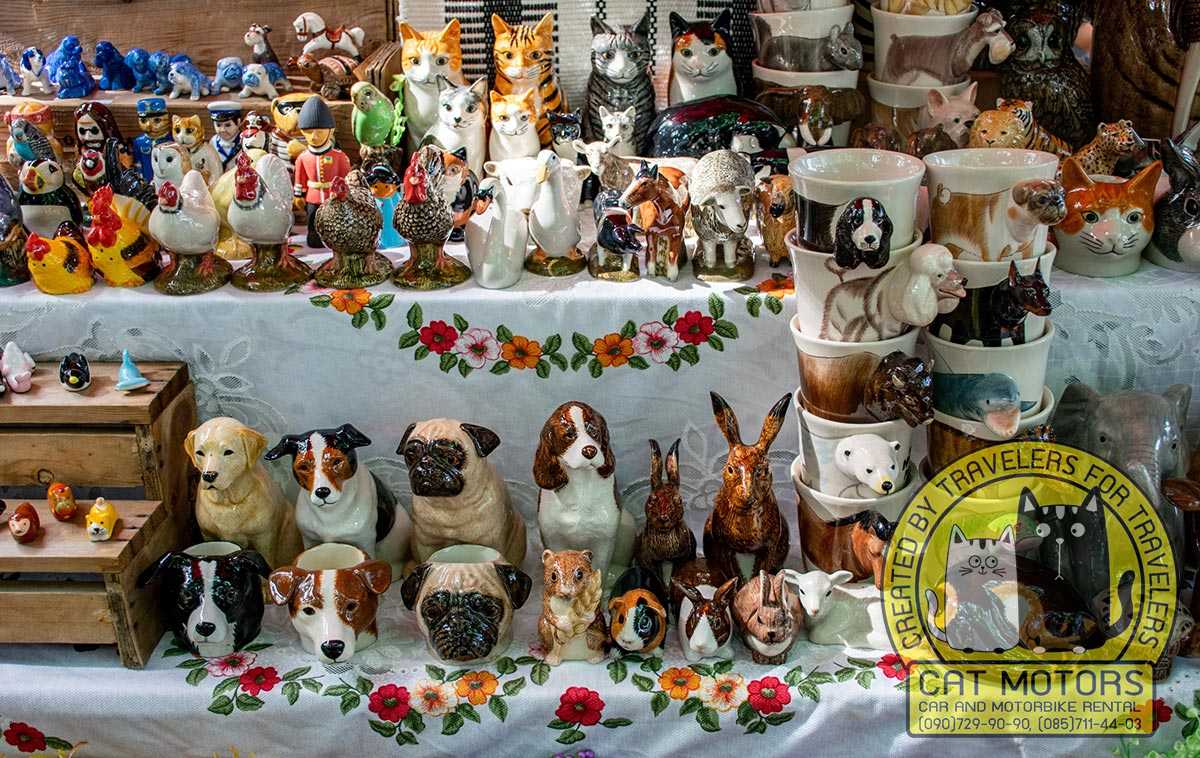
Summary
Jing Jai Market, an open-air market in Chiang Mai, offers a unique shopping experience with a focus on organic, locally sourced produce, and eco-friendly products. Established in 2012 as part of the Central Group’s CSV project, the market supports local businesses and promotes healthy food awareness. Open every weekend, it features various food stalls, artisan crafts, handmade clothing, and unique souvenirs. Visitors can enjoy live music performances, indulge in mouth-watering Thai dishes, and explore a wide array of handicrafts and souvenirs. Jing Jai Market is a must-visit attraction for tourists and residents looking to immerse themselves in Chiang Mai’s rich culture and support local businesses.
FAQ
Jing Jai Market is located on Atsadathon Road in the Pa Tan subdistrict, Muang district, Chiang Mai, Thailand.
Jing Jai Market is an open-air market that promotes healthy food awareness, supports local businesses, and encourages sustainable practices. It offers an authentic shopping experience for visitors, showcasing local culture, handicrafts, and food.
The JJ Market Project is open daily from 9:00AM to 8:00PM, and the Farmers’ and Rustic Weekend Market is open from 6:30AM to 2:00PM on Saturdays and Sundays.
Jing Jai Market provides a platform for local farmers, artisans, and food vendors to sell their products, boosting their incomes. The market encourages the sale of organic, pesticide-free produce and follows strict food safety regulations.
Visitors can find a wide variety of products, including organic produce, artisan crafts, handmade clothing, unique souvenirs, and street food.
Yes, Jing Jai Market hosts festivals, parades, music performances, and other events. The venue also features an art gallery showcasing local artists’ work.
Jing Jai Market offers a range of food options, including traditional Thai dishes, vegan and vegetarian meals, and organic produce. The market also has a variety of snack options, including edible insects.
Jing Jai Market requires all farmers to hold certificates or documents declaring their produce is organic and pesticide-free. Market officials perform regular inspections and random checks on chemical residues in products. Food safety regulations are also strictly enforced.
Jing Jai Market has had a significant impact on the local economy and community by providing a sustainable income source for local farmers and artisans, promoting Chiang Mai products, and attracting international and local visitors, contributing approximately $1.7 million annually to the Thai economy.
When bargaining, start with a price 30%-40% below the initial offer and be prepared to negotiate. Show respect for Thai customs by smiling, returning the traditional “wai” greeting, using your right hand to pass items or money, and being patient and polite during interactions. Avoid touching anyone’s head, pointing at people, or disrespecting the king or his image.
Immerse yourself in the beauty of Northern Thailand with our comprehensive travel guides that highlight the best routes and attractions. To begin your adventure, visit our scooter rental in Chiang Mai homepage for the best rental options. Don’t forget to check our rental terms to make your rental process seamless. These resources will prepare you to navigate Northern Thailand’s picturesque landscapes and cultural treasures.
Our website also offers valuable advice on riding safely, local customs, and essential travel tips. This information will help you make the most of your trip, ensuring it is both enjoyable and safe.
Was this post useful for you?
You can rate it by clicking on a star
Average rating / 5. Vote count:
No votes so far! Be the first to rate this post.
We are sorry that this post was not useful for you!
Let us improve this post!
Tell us how we can improve this post?
- Author: Krit Sorenser
- Updated: March 26, 2025
- No Comments




